The recipients of the Distinguished Alumni Awards 2019 are business leaders Rob Campbell and Whaimutu Dewes; Pasifi ka academic Tagaloatele Professor Peggy Fairbairn-Dunlop; sustainable building advocate Pamela Bell; astronaut Dr Alexander Gerst; and judge, youth justice advocate, and co-founder of Wellington’s Circa Theatre Judge Carolyn Henwood.
Chancellor Neil Paviour-Smith said the award recipients had established themselves as leaders in their respective fields over the course of their careers, and were outstanding examples of what graduates from Victoria University of Wellington could achieve.
"These alumni have achieved at the very highest level and made an immeasurable difference to those around them. In their different ways, each of these award winners has demonstrated the best of the University’s values and the quality of an education from our institution. We are honoured to count them as alumni.”
Pamela Bell
(BArch 2003, MArch 2009)
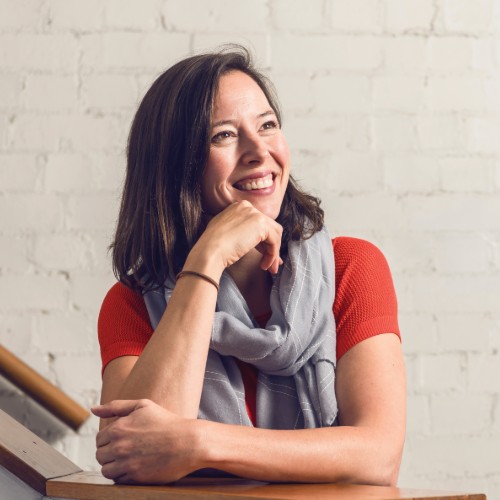
Pamela Bell is the founder and former chief executive of PrefabNZ, and is one of New Zealand’s leading advocates for sustainable innovative building methods.
Ms Bell came to prominence as a sportswoman, competing in the – Winter Olympics in Japan as New Zealand’s first Olympic snowboarder. She went on to found the New Zealand Snowboard Academy along with her own snowboarding clothing company, Fruition Snow System.
After completing a Bachelor’s degree in Architecture at Victoria University of Wellington, Ms Bell worked in the profession and undertook aid work in Africa before returning to New Zealand to raise her family and complete a Master’s degree focused on prefabricated housing. Her research prompted her to organise a Kiwi Prefab Workshop at the University’s School of Architecture and Design, which was attended by more than 140 people who called for an industry organisation to be established. Ms Bell took up this challenge and founded PrefabNZ.
Under her leadership, PrefabNZ has showcased innovative prefabricated buildings nationwide and organised a number of major events to educate industry, government, and the broader public about how off site construction can address housing shortages and improve the sustainability of our future housing. The group numbers almost 400 member organisations and advocates for the numerous advantages that prefabrication offers to increase quality, save time, improve health and safety, and reduce material waste. As well as stimulating discussion in New Zealand, PrefabNZ has inspired similar movements in other countries, such as prefabAUS in Australia.
As well as functioning as an advocacy group, PrefabNZ actively encourages innovation in building methods by sowing seeds and showcasing best practice. One example is the 2015 UNIpod design competition for an open-source universally accessible bathroom and kitchen pod, designed specifically for multi-unit residential applications. The winning design was made into a prototype that was launched at the PrefabNZ CoLab conference in Auckland in 2016. The design is open source and available for all to use, a first for New Zealand.
More recently, the SNUG ‘home in my backyard’ design competition attracted 86 high-quality secondary or accessory housing options, with 12“ winning designs launched at PrefabNZ’s CoLab 2019.
Rob Campbell
(BA 1972, BA(Hons) 1974)
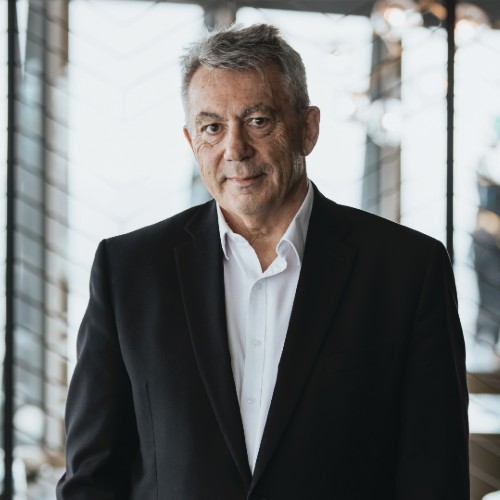
Rob Campbell is a professional business director and an advocate for more equitable and responsible practices in business management.
Mr Campbell trained as an economist at Victoria University of Wellington and went on to lecture there and at Massey University. After joining the union movement in the 1970's, he became a member of the Labour Party executive and was subsequently offered a directorship of New Zealand Post, which was the beginning of a new career as a professional director.
Mr Campbell has held many directorships over the course of a 30-year career in investment management and corporate governance. Currently, he chairs the boards of Skycity Entertainment Group, Summerset Group Holdings, Tourism Holdings, and WEL Networks. He is a director for a number of other companies, and is also the owner and director of Tutanekai Investments. In recent years, he has overseen the successful listing of retirement village operator Summerset Group, transforming it into one of the leading organisations in that industry. In a similar vein, Tourism Holdings more than doubled its earnings in the first three years of his tenure as chair.
As well as significantly improving these companies’ financial performance, Mr Campbell has become an outspoken critic of some of the systemic problems he sees in corporate governance, including a lack of diversity on boards and the need for directors to become more actively involved in the management of businesses. He has taken significant steps to address these issues in the businesses with which he is involved, and his public advocacy earned him the Beacon Award for business leader of the year in 2017 from the New Zealand Shareholders Association, which applauded his willingness to speak out on issues "without fear or favour”.
Whaimutu Dewes
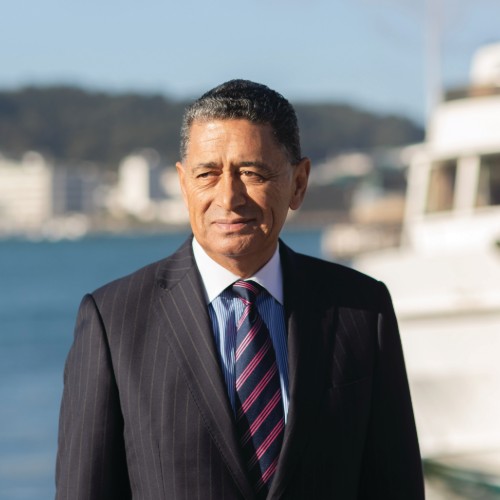
Ngāti Porou and Ngāti Rangitihi(BA 1975, LLB 1977, MPA 1988)
Whaimutu Dewes is a prominent business leader, particularly in the seafood industry, and a strong advocate for Māori economic development. After graduating from Victoria University of Wellington, Mr Dewes joined the public service, rising to become the chief legal adviser in what was then the Department of Māori Affairs. In 1988, he was a guest scholar at the Brookings Institution in Washington, D.C., looking at Māori economic development, and in the same year he graduated with a Master of Public Administration from the Kennedy School of Government at Harvard.
Subsequently, Mr Dewes worked in senior roles for Fletcher Challenge and held directorships at organisations including Housing New Zealand, Television New Zealand, Māori Television, and Ngāti Porou Holding Company. He currently serves on the board of Contact Energy and chairs Ngati Porou Seafoods and Ngati Porou Forestry.
He has established himself as a leader in Māori business organisations, with particular expertise in fisheries, and is the current chairman of Sealord Group and Moana New Zealand. He also served as a member of the Treaty of Waitangi Fisheries Commission in its first 10 years.
Mr Dewes is also a prominent advocate for the revitalisation of te reo Māori. His involvement in this movement dates from membership of Victoria University of Wellington’s Te Reo Māori Society and his part in the campaign that resulted in the te reo Māori 1972 petition to Parliament. Those efforts led to the establishment, in 1975, of Māori Language Week and the Māori Language Act 1987. Mr Dewes regards the fact that he and his wife, Judy, have raised their children to be fluently bilingual as their most rewarding achievement.
In 2018, he was awarded the Māori Governance Leader Award as part of the Māori Business Leader Awards.
Tagaloatele Professor Peggy Fairbairn-Dunlop
Sa Petaia, Sa Te’o, and Sa Atoa (BA 1974, BA(Hons) 1977, MA 1982)
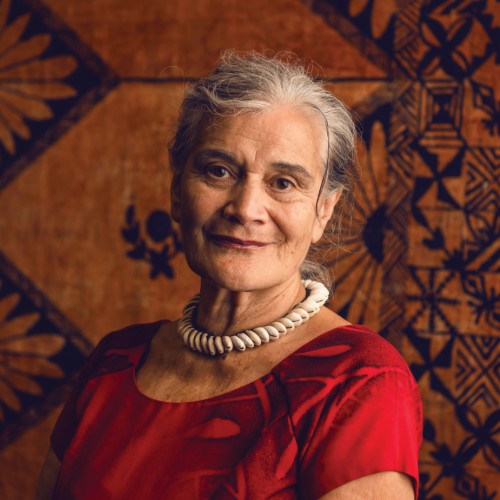
Tagaloatele Professor Peggy Fairbairn-Dunlop is a trailblazing Pasifika academic and an expert in a range of Pacific development issues, including national sustainable development, gender equality, and youth equity.
An emeritus professor of Pacific Studies at Auckland University of Technology, Professor Fairbairn-Dunlop has had a long career fostering the involvement and achievement of Pasifika students in tertiary institutions.
After completing doctoral studies in Australia, she returned to Victoria University of Wellington, where she had undertaken Bachelor’s and Master’s degrees, to become the inaugural director of the Pacific Studies department, Va‘aomanu Pasifika.
As well as supervising graduate students, she established the Pacific Postgraduate Talanoa national seminar series. Now in its 12th year, it has been invaluable not only for the quality of research shared but also for its fostering of a support network for Pasifika students and academics in New Zealand, and for establishing connections with peers across the Pacific and in the United States.
Professor Fairbairn-Dunlop has made major contributions to government and non-governmental organisations’ policy affecting the Pasifika community. Her work has been devoted to documenting Pasifika and indigenous knowledge and knowledge-building processes, and looking at how these values, beliefs, and practices might be integrated with decision-making at a local, national, and global level.
She has held posts with the United Nations Development Fund for Women and the United Nations Development Fund in the Pacifc. In New Zealand, she has served as chair of the Health Research Council Pacific team and she sits on a number of Ministry of Education and Ministry of Health committees, as well as the social sciences committees of both the Royal Society Te Apārangi and UNESCO. She has served as the national president of PACIFICA Inc—New Zealand’s oldest organisation for Pacific women in New Zealand—and in 2017 she was one of four commissioners appointed to oversee Samoa’s first-ever national inquiry into family violence.
Dr Alexander Gerst
(MSc 2003)
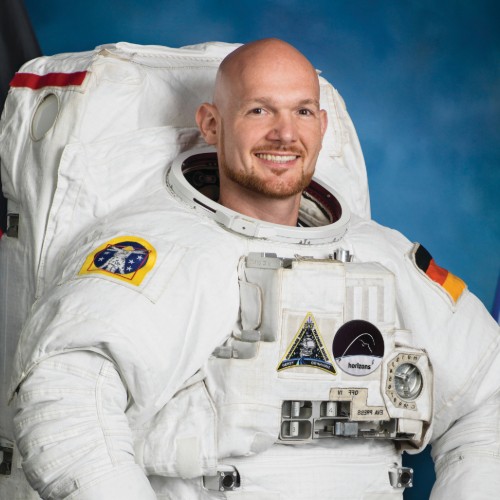
Dr Alexander Gerst is a highly regarded volcanologist and astronaut, who has undertaken two missions to the International Space Station (ISS).
During his graduate studies at Victoria University of Wellington, Dr Gerst developed new volcano-monitoring techniques that can improve volcanic-eruption forecasting. He continued this work during a doctorate undertaken at the University of Hamburg, for which he received the Bernd Rendel award for outstanding research from the German Research Foundation.
After completing his doctorate, Dr Gerst was elected as an astronaut by the European Space Agency in 2009. Since then, he has been a member of the European Astronaut Corps, based in the European Astronaut Centre in Germany.
Dr Gerst first travelled into space in 2014, spending six months on the ISS as flight engineer, and he returned to the ISS in 2018 as commander. He is the first German to have held this position, and only the second European. For his work during the 2014 ISS mission, Dr Gerst was awarded the Officer’s Cross of the Federal Republic of Germany.
During his space flights, Dr Gerst carried out a range of experiments on how various chemicals and elements behave in zero gravity, as well as testing new technologies to support future human space exploration. He is an enthusiastic science communicator and, while conducting his work on the ISS, maintained a popular blog detailing the progress of his experiments and shared photos and insights from space on social media platforms to a large international following.
Judge Carolyn Henwood
(LLB 1971)
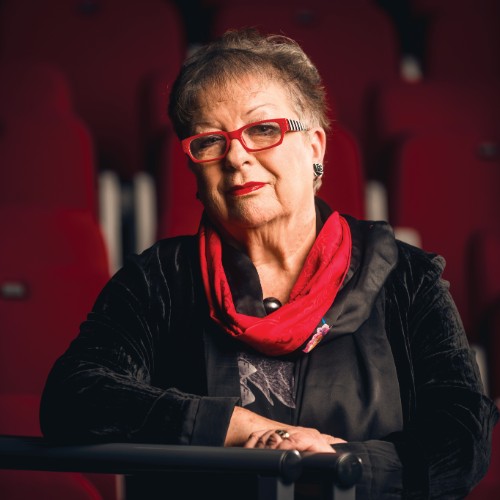
Judge Carolyn Henwood has had a distinguished career as a judge of the District Court and Youth Court, and as a prominent supporter of the arts.Graduating with a Bachelor of Laws from Victoria University of Wellington, Judge Henwood went on to become the first female judge of the District Court in Wellington. She has had a particularly prominent role in youth justice, serving as a Youth Court judge for many years, and has served on a number of government panels and published extensively on youth justice issues. Her expertise has been recognised on an international stage as well, thanks to leadership and convenor roles for a number of international conferences held in New Zealand, and a presentation in Washington, D.C. and at the University of Oxford.
In 2006, Judge Henwood was appointed as special adviser for the implementation of Te Hurihanga, a youth justice programme that aimed to prevent re-off ending by young people. She established, and continues to chair, the Henwood Trust, which provides independent policy advice and services to people and organisations working with young off enders. One notable example of the Trust’s work was its drafting of the Covenant for our Nation’s Children, which aims to protect children from violence, abuse, and neglect and was endorsed by a range of political parties and non-govermental organisations, including the Iwi Chairs Forum.
More recently, she served as the chair of the Confidential Listening and Assistance Service, which off ered people a chance to be heard by an independent panel if they had historic allegations of abuse or neglect while in the care of the state before 1992. This panel heard from more than 1,100 people, and made seven recommendations in 2015 to prevent future abuse and improve the way complaints are investigated.
In addition to her work in the judiciary, Judge Henwood has been involved in the theatre and arts sector for many years. She was a founding member of Circa Theatre in Wellington, a foundation trustee of the Theatre Artists Charitable Trust, and she remains an active member of both organisations. She has also served as deputy chair of the New Zealand Drama School / Toi Whaakari.
